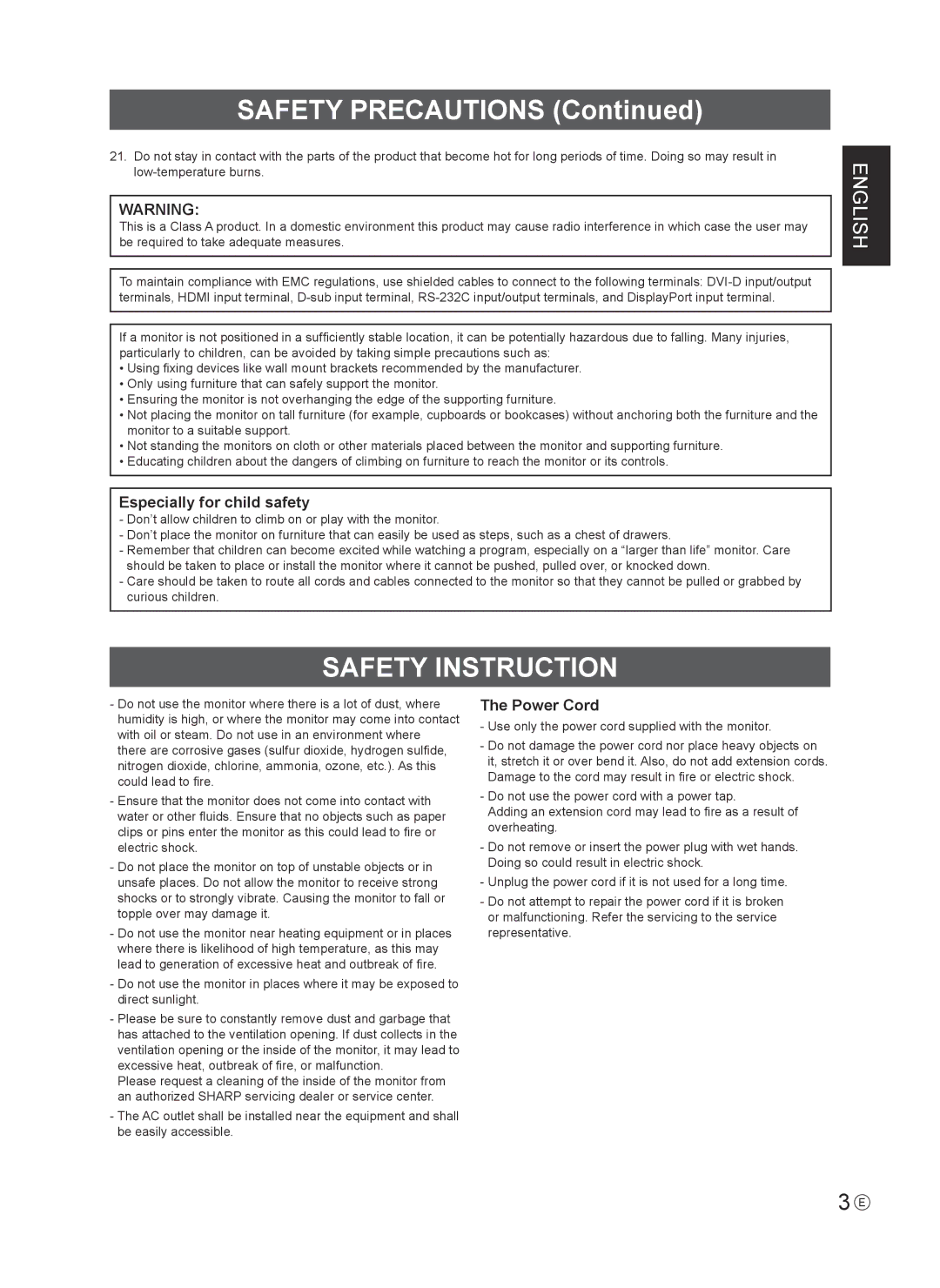
SAFETY PRECAUTIONS (Continued)
21. Do not stay in contact with the parts of the product that become hot for long periods of time. Doing so may result in
WARNING:
This is a Class A product. In a domestic environment this product may cause radio interference in which case the user may be required to take adequate measures.
To maintain compliance with EMC regulations, use shielded cables to connect to the following terminals:
If a monitor is not positioned in a sufficiently stable location, it can be potentially hazardous due to falling. Many injuries, particularly to children, can be avoided by taking simple precautions such as:
•Using fixing devices like wall mount brackets recommended by the manufacturer.
•Only using furniture that can safely support the monitor.
•Ensuring the monitor is not overhanging the edge of the supporting furniture.
•Not placing the monitor on tall furniture (for example, cupboards or bookcases) without anchoring both the furniture and the monitor to a suitable support.
•Not standing the monitors on cloth or other materials placed between the monitor and supporting furniture.
•Educating children about the dangers of climbing on furniture to reach the monitor or its controls.
Especially for child safety
-Don’t allow children to climb on or play with the monitor.
-Don’t place the monitor on furniture that can easily be used as steps, such as a chest of drawers.
-Remember that children can become excited while watching a program, especially on a “larger than life” monitor. Care should be taken to place or install the monitor where it cannot be pushed, pulled over, or knocked down.
-Care should be taken to route all cords and cables connected to the monitor so that they cannot be pulled or grabbed by curious children.
SAFETY INSTRUCTION
ENGLISH
-Do not use the monitor where there is a lot of dust, where humidity is high, or where the monitor may come into contact with oil or steam. Do not use in an environment where there are corrosive gases (sulfur dioxide, hydrogen sulfide, nitrogen dioxide, chlorine, ammonia, ozone, etc.). As this could lead to fire.
-Ensure that the monitor does not come into contact with water or other fluids. Ensure that no objects such as paper clips or pins enter the monitor as this could lead to fire or electric shock.
-Do not place the monitor on top of unstable objects or in unsafe places. Do not allow the monitor to receive strong shocks or to strongly vibrate. Causing the monitor to fall or topple over may damage it.
-Do not use the monitor near heating equipment or in places where there is likelihood of high temperature, as this may lead to generation of excessive heat and outbreak of fire.
-Do not use the monitor in places where it may be exposed to direct sunlight.
-Please be sure to constantly remove dust and garbage that has attached to the ventilation opening. If dust collects in the ventilation opening or the inside of the monitor, it may lead to excessive heat, outbreak of fire, or malfunction.
Please request a cleaning of the inside of the monitor from an authorized SHARP servicing dealer or service center.
-The AC outlet shall be installed near the equipment and shall be easily accessible.
The Power Cord
-Use only the power cord supplied with the monitor.
-Do not damage the power cord nor place heavy objects on it, stretch it or over bend it. Also, do not add extension cords.
Damage to the cord may result in fire or electric shock.
-Do not use the power cord with a power tap.
Adding an extension cord may lead to fire as a result of overheating.
-Do not remove or insert the power plug with wet hands. Doing so could result in electric shock.
-Unplug the power cord if it is not used for a long time.
-Do not attempt to repair the power cord if it is broken or malfunctioning. Refer the servicing to the service representative.
3 E
